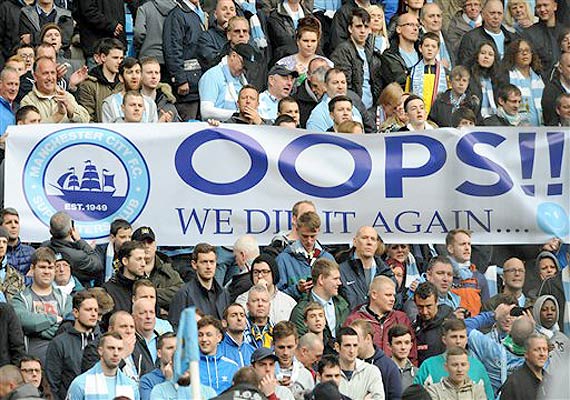MANCHESTER, England : Manchester City has deposed its neighbor as Premier League champions for the second time in three years, but is not close to usurping United's global supremacy -- both as a football club and as a brand. For many people, the word "Manchester" still equates simply with "United."
Even Premier League officials marked the end of the season by assuring United's American owners of the team's enduring power.
"They are the world's largest football club in my view with huge resources, with huge determination and a fantastic fan base," league chief executive Richard Scudamore told Sky Sports television. "Of course their time will come again."
However glum United fans felt as the blue half of Manchester celebrated into Monday morning, it's too early to see the humiliating seventh-place finish as the start of a downward spiral. Declarations that the balance of power has shifted in Manchester would be as premature as they were in 2012, when City last wrestled the trophy off United only to end the following season 11 points adrift.
United claims to have 659 million fans worldwide; City hasn't even tried to provide an estimate. United has been valued at $2.8 billion by Forbes magazine behind Real Madrid and Barcelona -- while City is seventh in the rankings at $863 million. And while City's income last year was around $449 million, United's was $602 million.
]
The big difference this time, however, is that there is no Alex Ferguson to plot the reclamation of the trophy. The immediate implication of United's fall from grace is the failure to qualify for Europe for the first time in 24 years. But falling short even of the Europa League spots might have been United's biggest achievement in a season when David Moyes' reign was curtailed with four matches remaining.
With nothing like the TV revenue or prestige of the Champions League, which United won in 1999 and 2008, the Europa League would have been a grueling slog across the continent to play less-illustrious teams in what seems to be a never-ending competition. While United earned around $50 million from the 2012-13 Champions League, it would have generated less than $14 million from UEFA for even winning the Europa League.
Missing out on that competitions provides another -- possibly much more lucrative -- way to cope with the loss of TV and ticket revenue. Taking advantage of its massive popularity abroad, United has considered using the mid-week breaks to play lucrative, trouble-free friendlies in the Middle East, which would also provide a paid-for warm-weather break.
United, most likely under Louis van Gaal, can focus its resources on the Premier League, and seek to emulate Liverpool's ascent from seventh to second in a year.
A prolonged absence from the elite European competition could, however, dissuade transfer targets from joining English football's most successful club or drive up the wages they can demand.
Globally it is difficult to assess the impact City has made, but it will take more than a couple of years of silverware to capture any fickle fans from rivals. When Barcelona fans came to Manchester for a Champions League match against City in February, many flocked to Old Trafford to visit English football's most famous club stadium.
United has a history of success, with 20 English titles and four European Cups alone. City's history is one largely based on near-misses and tales of the plucky loser forever in United's shadow. Despite more than $1 billion being injected into the club by Abu Dhabi's ruling family since its 2008 takeover, City only managed to win its fourth title on the final day of the season on Sunday ahead of a Liverpool side that has enjoyed a fraction of the investment.
City's principal problem is its spending. Or overspending, as UEFA sees it, in breach of Financial Fair Play regulations. City should be able to celebrate its newly elevated status in world football and the admirable investment in youth teams and a new training complex springing up next to the Etihad Stadium, but the club's leadership struggles to promote this grand vision to the world. Perhaps wary of having their accounts even more heavily scrutinized, City's leadership -- not just owner Sheikh Mansour but every executive -- remains silent in public in England.
City is embarking on a contrasting global strategy to its local rival. While United's commercial team is gobbling up sponsors of every product imaginable across every major continent, Mansour is amassing football clubs.
There's a team in New York that expects to start playing competitively in 2015, an existing club in Melbourne taken over this year, and Al Jazira in Abu Dhabi, but there will be little traction for these sides beyond the local markets.
United, with its brand strength, vast following and so many years of success to fall back on, should not be too troubled by its neighbor yet. But wary, yes. If their contrasting fortunes are repeated next season and United's share price in New York slumps, the Glazers might start to worry about their cash-rich Gulf rivals.

